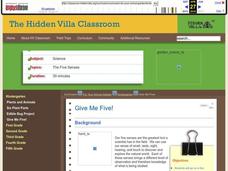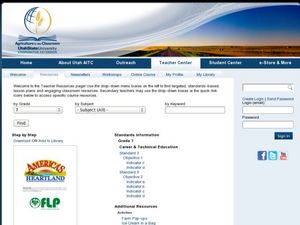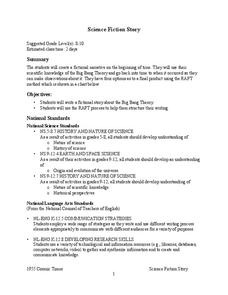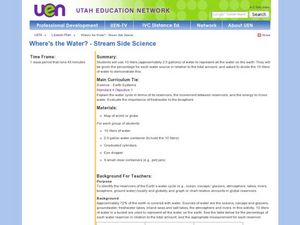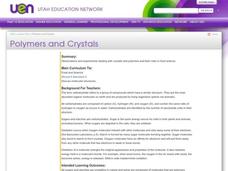media.yurisnight.net
Science Lesson Plan: Our Solar System: I Wonder?
Ever wonder why Pluto isn't considered a planet? Or how large the Earth is compared to the other inner planets? Explore the universe with a series of projects that simulate different aspects of our solar system. The activities require...
Curated OER
Give Me Five!
Students become familiar with their five senses and how their experiences would change without them. For this observations lesson, students observe using their five senses in a garden. Students illustrate what they've...
Washington Office of Superintendent of Public Instruction
Using Our Senses to Observe
Look around and explore. Little ones use their five senses with some day-to-day activities designed to guide observation and apply STEM strategies. Young scientists learn through comparing/contrasting and...
Curated OER
Clouds
Incorporate art and poetry into an early elementary science lesson about cloud formation. With fun and engaging activities that follow a natural learning progression, youngsters will develop key vocabulary and conceptual understanding...
Curated OER
Our Solar System and Seasons
Sixth graders investigate the relative diameters of planets and distances between them and the cause for seasons on Earth using the 5-E Learning Model. They appreciate the size and distances involved with objects in the real universe....
Curated OER
America's Heartland: Step-By-Step Lesson Guide
An excellent resource gets kids looking at agricultural production to better understand the careers needed in distributing foods from the farm to the consumer. Book, poster, web, and video links are included for teacher use. There is...
Curated OER
Exploring Living Science Careers
Use a variety of group activities to explore living science careers. Living science careers include everything from a food scientist or farmer to a veterinarian or agricultural economist. Kids will discuss 31 different careers in this...
American Chemical Society
A Catalyst and the Rate of Reaction
More than 90 percent of chemical products are made using a catalyst. Lesson demonstrates the way a catalyst changes the rate of reaction without altering the chemical reaction. A catalyst doesn't appear as a reactant or a product, yet it...
American Chemical Society
Density of Water
We know solids have a density we can measure, but what about liquids? Lesson explores this concept and allows scholars to explore the relationship between volume and density. Graphing and analysis questions round out the activity.
American Chemical Society
Density: Sink and Float for Solids
Steal cubes sink, but steal ships float. Lesson explores the density of solids as well as the density of water in determining what will sink and what will float. A hands-on group activity helps pupils see that weight and volume are...
American Chemical Society
Controlling the Amount of Products in a Chemical Reaction
Everyone enjoys combining baking soda and water. Here is a instructional activity that challenges scholars to analyze the reaction three different ways — the real substances, the chemical equation, and the molecular...
University of California
Hot! Hot! Hot!
Calories are not tiny creatures that sew your clothes tighter every night, but what are they? A science lesson, presented at multiple levels, has learners experiment with heat, heat transfer, and graph the function over time....
NASA
Science Fiction Story
A instructional activity allows you to go back in time and see the big bang actually happen. Bazinga! In reality, pupils research the Big Bang Theory and theorize what it would be like to go back in time and see it happen....
American Chemical Society
Molecules Matter
Did you know that jumping spiders sometimes wear water droplets as hats? A seventh grade science instructional activity introduces the concept of what makes up water: tiny molecules that are attracted to each other....
American Chemical Society
Molecules in Motion
I heard that oxygen and magnesium were going out and I was like "O Mg." Pupils experiment with adding food coloring to water of various temperatures in order to determine how temperature impacts molecular movement. This is the...
Consortium for Ocean Science Exploration and Engagement (COSEE)
Arctic Smorgasbord
Though the walrus spends roughly one third of its time on land, it eats organisms that live on the bottom of the ocean. The first in a series of five, the lesson uses a variety of plant and animal cards to have scholars build an arctic...
Curated OER
Our Five Senses
Students are introduced to the five senses through tasks that require them to use each sense in isolation. Students discover how humans use their senses to learn more about their environment.
Curated OER
Science Vocabulary game
Play a memory game with science vocabulary words to prepare for an upcoming test! Build both understanding and retention of new vocabulary words by setting up a matching game for your learners to play in small groups of three to...
Curated OER
Apples: Family and Consumer Science
Learning to cook and making good food choices are extremely important life skills. Seventh graders explore food science in relation to health and nutrition, by conducting several experiments on apples. Websites, movies, and instructional...
Curated OER
Where's the Water? Stream Side Science
After a whole-class discussion of water reservoirs, ten liters of water are given to each lab group to represent Earth's total amount of water. They divide the water into smaller containers, each representing one of those reservoirs. The...
Mascil Project
Pottery
Don't cry over broken pottery. A cross-curricular lesson plan challenges pupils to consider how to restore ancient pottery. Using a computer program and their knowledge of transformations, they come up with a way to recreate the original...
Curated OER
Polymers and Crystals: Their Role in Food Science
Blend chemistry with cooking in this exploration of polymers, carbohydrates, and food science. Experimenting with gelatin produces concrete examples of the bonding and ploymerization discussed in the activity. Copious, comprehensive...
EduGAINs
Go H2O! Investigating Residential Water Systems
Before your learners excuse themselves to get a drink at the water fountain, prompt them to think about where that water comes from. A middle school science lesson encourages groups to research their community's source of drinking water,...
NASA
Unsung Heroes of Science
Scholars research scientific heroes who haven't been given enough credit for their discoveries. While many are women, there are also men to whom credit is overdue.

